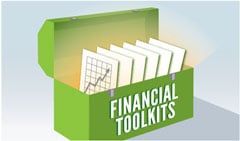The ABCs of FICO Credit Score
Have you ever wondered why financial professionals make a fuss about credit/FICO scores? You may not think your credit score is a big deal, especially if your income is healthy; however, your income has nothing to do with your credit score. You can make a king’s ransom and have a poor credit score – or have a small income and a very high credit score. So here are some basic facts about FICO and credit scores.
What is a FICO score and how does it work?
FICO stands for Fair Isaac Corporation, which is the company that created the industry standard credit scores used by almost all lenders. FICO has been in business since the 1950s but began building the famous FICO score in the mid 1980s.1
FICO scores are the credit scores used by banks, mortgage companies, and retailers to determine your credit risk. You have three FICO scores, one for each of the three credit bureaus – Experian, TransUnion and Equifax.
These scores are determined from data contained in your credit report. The contents of your credit report typically include what loans you have secured; how much is owed on a loan (balance); and how promptly (or tardy) you have been in making your loan payments.
According to FICO, there are general guidelines used to determine your credit scores – although the actual weight of each of these categories may vary by individual. Here are the key factors:
- 35% Payment History
- 30% Amount Owned
- 15% Length of Credit History
- 10% New Credit
- 10% Types of Credit Used
Payment History is the most heavily weighted, and it includes your history of paying credit cards, retail accounts, and loans. In short, do you pay your bills on time, every time? Even a few late payments can adversely affect your scores – and of course very late or unpaid bills are damaging to your credit scores.
Amounts Owed is considered because it affects your capacity to pay any new loans. It is a good idea to keep balances on credit cards and retail accounts low, demonstrating that you are not carrying a heavy debt load. It is also important to consider your credit limits, as high credit limits and low amounts owed weigh in your favor. It shows that you handle credit responsibly.
Length of Credit History is examined, but it is one of the few elements you cannot change quickly. If you are young and have not applied for loans or held any credit cards in your name, it is a good idea to keep current on any and all payments you hold in your name – including utility payments or overdraft accounts, since these payments often comprise your early payment habits and history.
New Credit will be looked at. FICO and the credit bureaus will review how many accounts were opened recently. They will also look at how many times lenders have inquired into your credit, as this may be an indicator of a problem.
Types of Credit Used matters because it indicates if you are using credit in a financially responsible manner.
According to FICO, the organization takes into consideration all these categories of information, not just one or two. The importance of any factor depends on the overall information in your particular credit report. In addition, as the information in your credit report changes, so does the score.
Remember you are in control.
Improving your credit score is not only possible, but also a worthwhile effort since it can save you money in the long run. FICO and financial professionals agree that there are steps you can take immediately and intermittently to help raise your score in the long term:
Start by checking your Credit Report
- Request a credit report annually- www.annualcreditreport.com. This site includes all three agencies: Equifax, Experian and Transunion. Once a year you may review all three reports for free.
- See what is there.
- Dispute any incorrect information.
- View your credit before you apply for a mortgage.
Pay your bills on time.
If you have missed payments, get current and stay current. Positive information says you're managing your credit well. Generally, people with high FICO scores consistently pay bills on time. If you are comfortable doing so, on-line bill payment and reminders are effective tools that can help. The goal is to reduce your overall debt, so add up how much you owe, what interest rate you are paying, and pay off high interest rate cards and loans first.
A good FICO score can save you money.
Even the wealthy are not immune from credit reporting, so a solid credit score is important to everyone. Credit matters because it is your lifeline to obtaining loans. The higher your score, typically the lower your cost of borrowing.
Sources & Resources:
To learn more, visit:
MyFICO.com
AnnualCreditReport.com
GSA Federal Citizen Information Center:
http://publications.usa.gov/USAPubs.php?PubID=3379
Federal Trade Commission:
http://www.ftc.gov/bcp/edu/microsites/freereports/index.shtml
Credit Bureaus:
Transunion.com
Experian.com
Equifax.com
1 http://www.credit.com/answers/questions/258/What-does-FICO-stand-for-and-what-is-a-FICO-credit-score
Heidi Clute, CFP® of Clute Wealth Management in South Burlington, VT and Plattsburgh, NY, an independent firm and registered investment advisor that provides strategic financial and investment planning for individuals and small businesses in the Champlain Valley region of New York and Vermont. Clute Wealth Management and LPL are separate entities. The opinions voiced in this material are for general information only and not intended to provide specific advice or recommendations. LPL Financial does not offer legal or tax advice.
Securities offered through LPL Financial. Member FINRA/SIPC.


